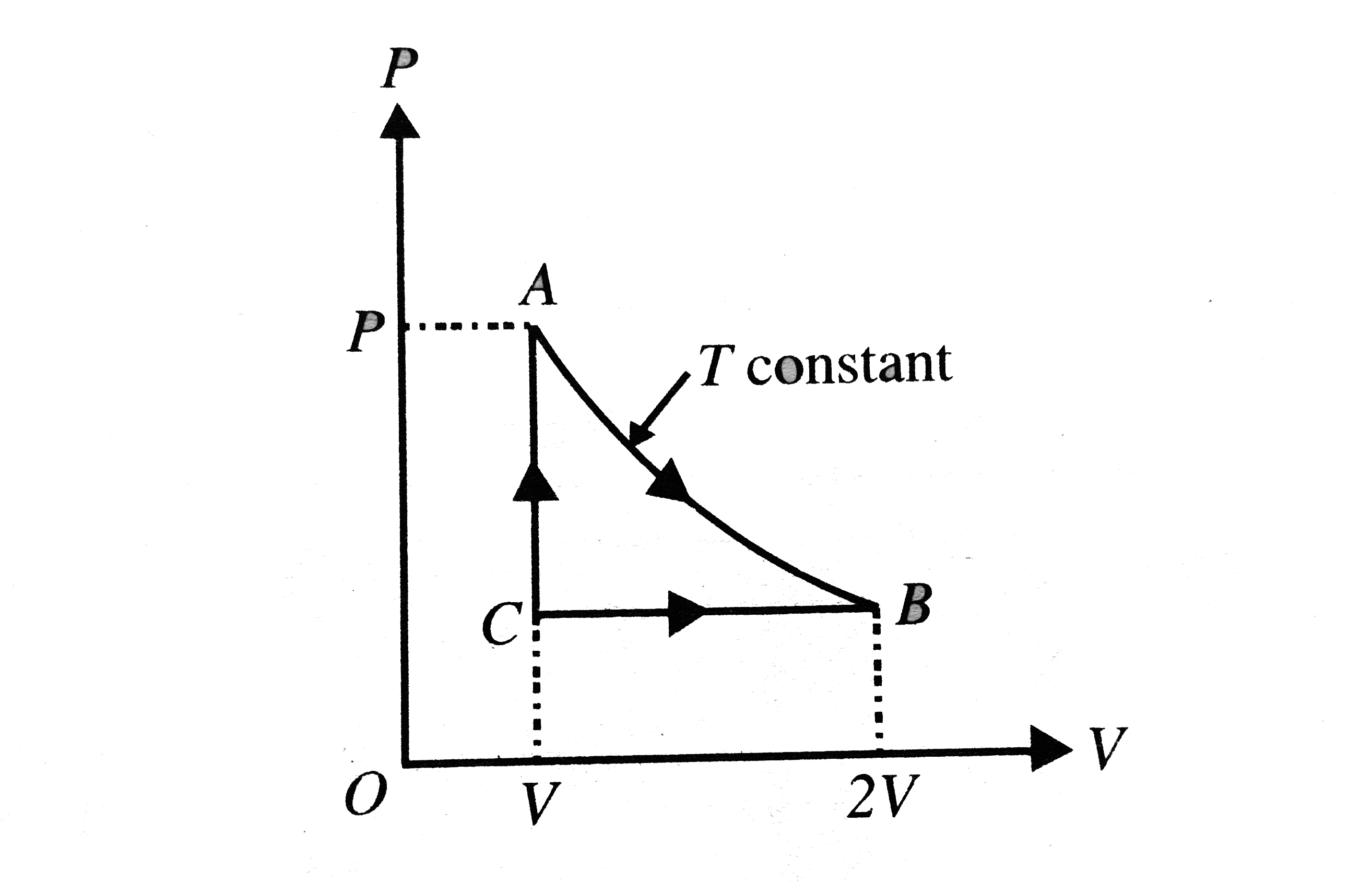At a constant temperature a gas is initially at 2 atm pressure. To compress it to 1/8th of its initial volume, pressure to be applied is
4atm
8atm
12atm
16atm
The correct Answer is:D
To solve the problem, we will use Boyle's Law, which states that for a given mass of gas at constant temperature, the product of pressure and volume is constant. This can be mathematically expressed as:
P1V1=P2V2
Where:
- P1 = initial pressure
- V1 = initial volume
- P2 = final pressure
- V2 = final volume
1. Identify the Given Values:
- Initial pressure, P1=2 atm
- The gas is compressed to 18 of its initial volume, which means V2=18V1.
2. Set Up the Boyle's Law Equation:
- According to Boyle's Law:
P1V1=P2V2
3. Substitute the Known Values:
- We know that V2=18V1. Substitute this into the equation:
2atm⋅V1=P2⋅(18V1)
4. Simplify the Equation:
- Cancel V1 from both sides (assuming V1≠0):
2=P2⋅18
5. Solve for P2:
- Multiply both sides by 8 to isolate P2:
P2=2⋅8=16atm
6. Conclusion:
- The pressure to be applied to compress the gas to 18 of its initial volume is 16 atm.
Final Answer:
The pressure to be applied is 16 atm.
---
- P1 = initial pressure
- V1 = initial volume
- P2 = final pressure
- V2 = final volume
- Initial pressure, P1=2 atm
- The gas is compressed to 18 of its initial volume, which means V2=18V1.
- According to Boyle's Law:
P1V1=P2V2
- We know that V2=18V1. Substitute this into the equation:
2atm⋅V1=P2⋅(18V1)
- Cancel V1 from both sides (assuming V1≠0):
2=P2⋅18
- Multiply both sides by 8 to isolate P2:
P2=2⋅8=16atm
- The pressure to be applied to compress the gas to 18 of its initial volume is 16 atm.
The pressure to be applied is 16 atm.
Similar Questions
Gas is enclosed in a cylinder under S.T.P. conditions. At what temperature does the volume of the enclosed gas become 1/6th of its initial volume, pressure remaining constant ?
View SolutionOne mole of a gas is carried through the cycle shown in Fig. The gas expands at constant temperature T from volume V to 2V. It is them compressed to the initial volume at constant pressure and is finally brought back to its original state by heating at constant volume. Calculate the work done by the gas in complete cycle.

View Solution
Knowledge Check
A gas is initially at 1 atm pressure. To compress it to 1/4 th of its initial volume, pressure to be applied is: 1 atm, 2 atm, 3 atm, 1/4 atm
A1 atmB2 atmC4 atmD1/4 atm.
Gas is enclosed in a cylinder at 273 K and 1 atm pressure condition . At what temperature , the volume of enclosed gas is reduced to 1/8th of its initial volume. Pressure is kept constant throughout.
View SolutionAn ideal gas at a pressure of 1 atm and temperature of 27∘C is compressed adiabatically until its pressure becomes 8 times the initial pressure , then final temperature is (γ=32)
View SolutionAn ideal gas at initial temperature 300 K is compressed adiabatically (γ=1.4) to (116)th of its initial volume. The gas is then expanded isobarically to double its volume. Then final temperature of gas round to nearest integer is:
View SolutionAn ideal gas at initial temperature 300 K is compressed adiabatically (γ=1.4) to (116)th of its initial volume. The gas is then expanded isobarically to double its volume. Then final temperature of gas round to nearest integer is:
View SolutionCan the temperature of a gas increased keeping its pressure and volume constant ?
View SolutionA gas for which γ=1.5 is suddenly compressed to 1/4 th of the initial volume. Then the ratio of the final to initial pressure is
View SolutionBy increasing temperature of a gas by 6∘C its pressure increases by 0.4%, at constant volume. Then initial temperature of gas is
View Solution
